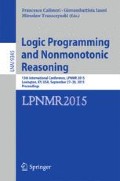Abstract
Integrating knowledge from various sources is a recurring problem in Artificial Intelligence, often addressed by multi-context systems (MCSs). Existing MCSs however have limited support for the open-world semantics of knowledge bases (KBs) expressed in knowledge representation languages based on first-order logic. To address this problem we introduce knowledge base networks (KBNs), which consist of open-world KBs linked by non-monotonic bridge rules under a stable model semantics. Basic entailment in KBNs is decidable whenever it is in the individual KBs. This is due to a fundamental representation theorem, which allows us to derive complexity results, and also gives a perspective for implementation. In particular, for networks of KBs in well-known Description Logics (DLs), reasoning is reducible to reasoning in nonmonotonic dl-programs. As a by product, we obtain an embedding of a core fragment of Motik and Rosati’s hybrid MKNF KBs, which amount to a special case of KBNs, to dl-programs. We also show that reasoning in networks of ontologies in lightweight DLs is not harder than in answer set programming.
Access this chapter
Tax calculation will be finalised at checkout
Purchases are for personal use only
Notes
- 1.
- 2.
This was the setting of the initial version of [20]. A so-called generalized atom, i.e. a complex formula, can be replaced by a standard atom whenever it is expressible in the considered DL.
- 3.
If \(\approx \) is present in \(\mathcal {O}\), then its axiomatization must be added to P to preserve the correspondence. This is a general way to simulate equality under the SNA.
References
Baader, F.: The Description Logic Handbook: Theory, Implementation, and Applications. Cambridge University Press, New York (2003)
Bikakis, A., Antoniou, G.: Defeasible contextual reasoning with arguments in ambient intelligence. IEEE Trans. Knowl. Data Eng. 22(11), 1492–1506 (2010)
Borgida, A., Serafini, L.: Distributed description logics: assimilating information from peer sources. In: Spaccapietra, S., March, S., Aberer, K. (eds.) Journal on Data Semantics I. LNCS, vol. 2800, pp. 153–184. Springer, Heidelberg (2003)
Bouquet, P., Giunchiglia, F., van Harmelen, F., Serafini, L., Stuckenschmidt, H.: Contextualizing ontologies. J. Web Sem. 1(4), 325–343 (2004)
Brewka, G., Eiter, T.: Equilibria in heterogeneous nonmonotonic multi-context systems. In: Proceedings of AAAI 2007 (2007)
Calvanese, D., De Giacomo, G., Lembo, D., Lenzerini, M., Rosati, R.: Inconsistency tolerance in P2P data integration: an epistemic logic approach. Inf. Syst. 33(4–5), 360–384 (2008)
Donini, F.M., Nardi, D., Rosati, R.: Description logics of minimal knowledge and negation as failure. ACM Trans. Comput. Log. 3(2), 177–225 (2002)
Eiter, T., Faber, W., Fink, M., Woltran, S.: Complexity results for answer set programming with bounded predicate arities and implications. Ann. Math. Artif. Intell. 51(2–4), 123–165 (2007)
Eiter, T., Ianni, G., Krennwallner, T., Schindlauer, R.: Exploiting conjunctive queries in description logic programs. Ann. Math. Artif. Intell. 53(1–4), 115–152 (2008)
Eiter, T., Ianni, G., Lukasiewicz, T., Schindlauer, R., Tompits, H.: Combining answer set programming with description logics for the semantic web. Artif. Intell. 172(12–13), 1495–1539 (2008)
Gelfond, M., Lifschitz, V.: The stable model semantics for logic programming. In: Proceedings of ICLP/SLP 1988, pp. 1070–1080. MIT Press (1988)
Giunchiglia, F., Serafini, L.: Multilanguage hierarchical logics or: how we can do without modal logics. Artif. Intell. 65(1), 29–70 (1994)
Grimm, S., Motik, B.: Closed world reasoning in the semantic web through epistemic operators. In: Proceedings of OWLED 2005. CEUR-WS.org (2005)
Homola, M.: Semantic Investigations in Distributed Ontologies. Ph.D. thesis, Comenius University, Bratislava, Slovakia, April 2010
Knorr, M., Hitzler, P., Maier, F.: Reconciling OWL and non-monotonic rules for the semantic web. In: Proceedings of ECAI 2012. IOS Press (2012)
Knorr, M., Slota, M., Leite, J., Homola, M.: What if no hybrid reasoner is available? Hybrid MKNF in multi-context systems. J. Logic Comput. (2014)
Kutz, O., Lutz, C., Wolter, F., Zakharyaschev, M.: E-connections of abstract description systems. Artif. Intell. 156(1), 1–73 (2004)
Lifschitz, V.: Minimal belief and negation as failure. Artif. Intell. 70(1–2), 53–72 (1994)
Mehdi, A., Rudolph, S.: Revisiting semantics for epistemic extensions of description logics. In: Proceedings of AAAI 2011 (2011)
Motik, B., Rosati, R.: Reconciling description logics and rules. J. ACM 57(5), 1–62 (2010)
Roelofsen, F., Serafini, L.: Minimal and absent information in contexts. In: Proceedings of IJCAI 2005 (2005)
Rosati, R.: Reasoning about minimal belief and negation as failure. J. Artif. Intell. Res. (JAIR) 11, 277–300 (1999)
Rosati, R.: Minimal belief and negation as failure in multi-agent systems. Ann. Math. Artif. Intell. 37(1–2), 5–32 (2003)
Serafini, L., Homola, M.: Contextualized knowledge repositories for the semantic web. Web Semant. 12–13, 64–87 (2012)
Acknowledgments
This work was supported by the Austrian Science Fund projects P25207 and P24090, and the Vienna Science and Technology Fund project ICT12-15.
Author information
Authors and Affiliations
Corresponding author
Editor information
Editors and Affiliations
Rights and permissions
Copyright information
© 2015 Springer International Publishing Switzerland
About this paper
Cite this paper
Eiter, T., Šimkus, M. (2015). Linking Open-World Knowledge Bases Using Nonmonotonic Rules. In: Calimeri, F., Ianni, G., Truszczynski, M. (eds) Logic Programming and Nonmonotonic Reasoning. LPNMR 2015. Lecture Notes in Computer Science(), vol 9345. Springer, Cham. https://doi.org/10.1007/978-3-319-23264-5_25
Download citation
DOI: https://doi.org/10.1007/978-3-319-23264-5_25
Published:
Publisher Name: Springer, Cham
Print ISBN: 978-3-319-23263-8
Online ISBN: 978-3-319-23264-5
eBook Packages: Computer ScienceComputer Science (R0)

